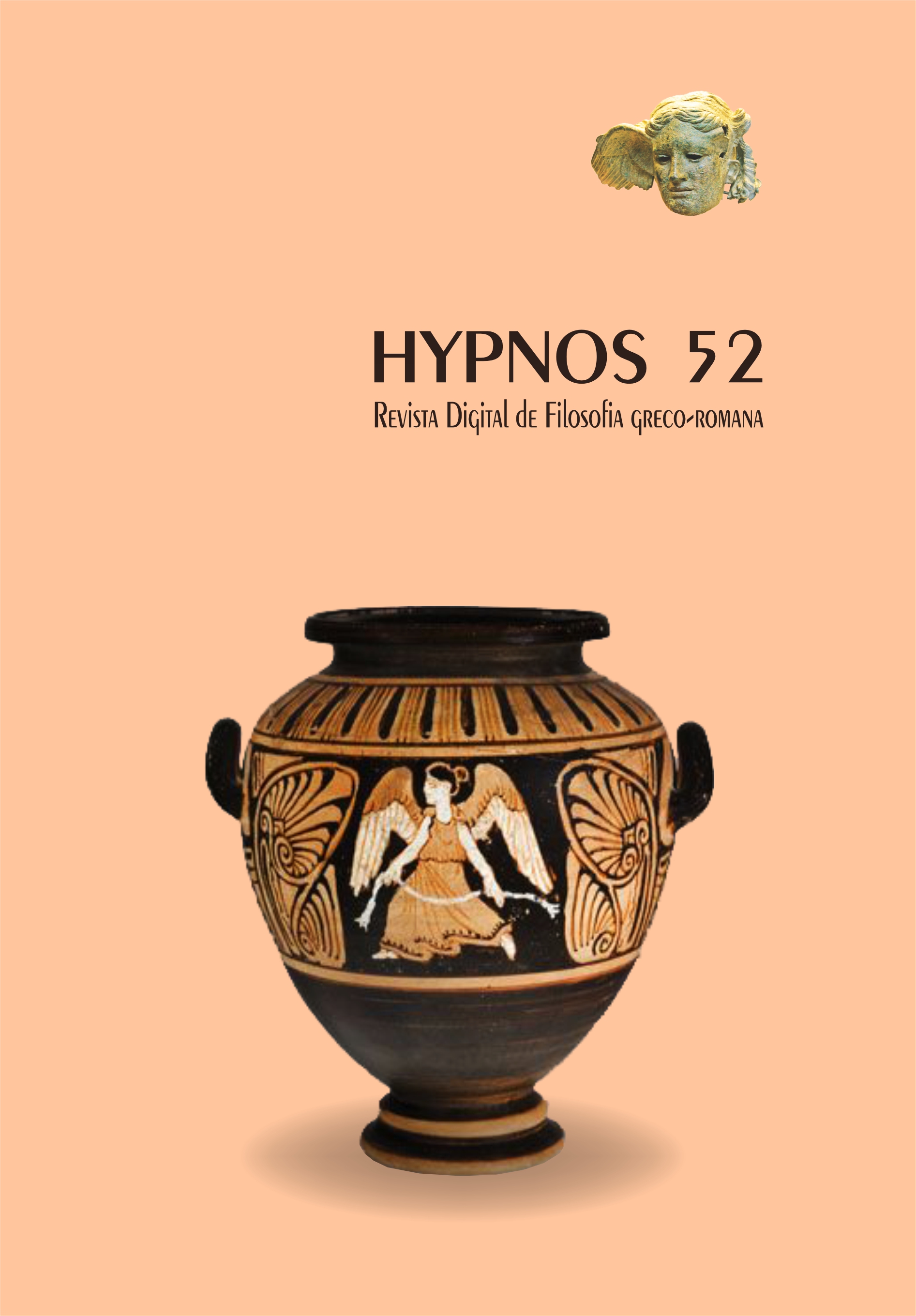¿Dialogar con qué? La vía socrática sobre los nombres en el Crátilo y la posibilidad de la dialéctica como método de investigación
Palavras-chave:
lenguaje, dialéctica, epistemología, CrátiloResumo
En este ensayo, sostenido en una interpretación del Crátilo, defiendo que Platón concibe necesaria la mediación del lenguaje natural para la investigación dialéctica de la realidad. En la discusión sobre la adecuación de los nombres, Sócrates sostiene una posición compatibilista entre el convencionalismo y el naturalismo que le permite juzgar la imperfección en el establecimiento de nombres. Tal reconstrucción nos permite concebir tanto la crítica a la etimología como método de investigación, como también a la dialéctica como método superador. El dialéctico, para tener éxito, debe tener en cuenta la necesaria imperfección de nuestros nombres.
Referências
Ackrill, J. L. (1997). Language and Reality in Plato’s Cratylus. En Essays on Plato and Aristotle. Oxford University Press, 33-52.
Ademollo, F. (2011). The Cratylus of Plato. A Commentary. Cambridge University Press.
Aubenque, P. (2021). Problemas aristotélicos. Ediciones Encuentro.
Barney, R. (1997). Plato on Conventionalism. En Phronesis 42(2). 143-162.
Barney, R. (2001). Names and Nature in Plato’s Cratylus. Routledge.
Bestor, T. W. (1980). Plato’s Semantics and Plato’s Cratylus. En Phronesis 25(3), 306-330.
Boeri, M. D. (2017). Dialéctica, pensamiento ‘intuitivo’ y ‘discursivo’ en Platón. En Tópicos, Revista de Filosofía 52, 12-42.
Calvo, J. L. (1983). Platón. Crátilo. J. L. Calvo (trad.), en Diálogos II. Madrid: Gredos.
Colvin, M. (2007). Heraclitean Flux and Unity of Opposites in Plato’s Theaetetus and Cratylus. En The Classical Quarterly 57(2), 759-769.
Demand, N. (1975). The Nomothetes of the Cratylus. En Phronesis 20(2), 106-109.
Divenosa, M. y Mársico, C. (2005). Platón. República. Buenos Aires: Losada.
Gadamer, H-G. (2017). Verdad y método. Ediciones Sígueme.
Grube, G. M. A. (1987). El pensamiento de Platón. Madrid: Gredos.
Guthrie, W. K. C. (1992). Historia de la Filosofía Griega (Vol. V). Madrid: Gredos.
Hestir, B. (2016). Plato on the Metaphysical Foundation of Meaning and Truth. Cambridge University Press.
Keller, S. (2000). An Interpretation of Plato’s Cratylus. En Phronesis 45(4), 284-305.
Ketchum, R. J. (1979). Forms and Conventionalism: Cratylus, 383-395. En Phronesis 24(2), 133-147.
Mársico, C. (2006). Platón. Crátilo. C. Mársico (trad.), Buenos Aires: Losada.
Martínez García (2004). Platón. Apología de Sócrates, Menón, Crátilo. O. Martínez García (trad.). Alianza.
Proclo (1999). Lecturas del Crátilo de Platón. Akal.
Robinson, R. (1955). The Theory of Names in Plato’s Cratylus. En Revue Internationale de Philosophie 9(32), 221-236.
Ross, D. (1955). The Date of Plato’s Cratylus. Revue Internationale de Philosophie 32, 187-196.
Schofield, M. (1982) The dénouement of the Cratylus. En Schofield y Nussbaum (eds.). Language and Logos. New York: Cambridge University Press, 61-81.
Sedley, D. (2003). Plato’s Cratylus. New York: Cambridge University Press.
Spangenberg, P. (2016). Platón contra el naturalismo: la dialéctica escalonada del Crátilo. Archai 18, 217-257.
Spellman, L. (1993). Naming and Knowing: The Cratylus on Images. History of Philosophy Quarterly 10(3), 197-210.
Williams, B. (1982). Cratylus’ Theory of Names and Its Refutation. En Schofield y Nussbaum (eds.). Language and Logos. New York: Cambridge University Press, 83-93.
Downloads
Publicado
Edição
Seção
Licença
Copyright (c) 2024 Revista Hypnos

Este trabalho está licenciado sob uma licença Creative Commons Attribution-NonCommercial-ShareAlike 4.0 International License.
O conteúdo dos manuscritos enviados é de responsabilidade exclusiva dos autores. Os textos devem ser originais. Caso tenham sido publicados em alguma revista não brasileira, o autor deve claramente indicar o nome, número e data da publicação e país. A editoria decidirá sobre o interesse em publicar na Hypnos.
O conteúdo dos manuscritos foi tácita ou explicitamente aprovada pela autoridades responsáveis onde se realizou a pesquisa.
Se aceito o manuscrito, o autor concorda em permitir sua publicação pela revista Hypnos, declinando de ganhos pecuniários decorrentes de direitos autorais. Caso o manuscrito venha a ser posteriormente publicado em outros meios, o autor concorda em fazer constar os créditos da primeira publicação na subsequente.
Caso o documento submetido inclua figuras, tabelas ou seções extensas de texto previamente publicados, o autor se declara responsável por ter obtido permissão dos detentores originais dos direitos autorais desses itens, tanto para a publicação em linha quanto impressa desta revista. Todo material com direitos autorais deve ter créditos adequadamente atribuídos no manuscrito.


 A revista
A revista 